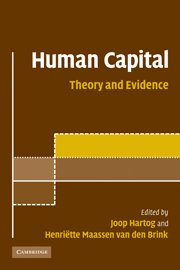Book contents
- Frontmatter
- Contents
- List of figures
- List of tables
- Notes on contributors
- Prologue
- Part I Measuring the benefits from human capital
- Part II Applying and extending the human capital model
- 7 Overeducation in the labour market
- 8 Underinvestment in training?
- 9 Human capital and risk
- Part III Policy interventions
- Epilogue: some reflections on educational policies
- A note on econometrics
- Index
- References
9 - Human capital and risk
Published online by Cambridge University Press: 22 September 2009
- Frontmatter
- Contents
- List of figures
- List of tables
- Notes on contributors
- Prologue
- Part I Measuring the benefits from human capital
- Part II Applying and extending the human capital model
- 7 Overeducation in the labour market
- 8 Underinvestment in training?
- 9 Human capital and risk
- Part III Policy interventions
- Epilogue: some reflections on educational policies
- A note on econometrics
- Index
- References
Summary
The risks of human capital investments
Schooling decisions involve far more than just choosing the optimum number of school years. Most schooling systems confront students with an increasing array of choices as they advance in their schooling career. Whereas at the elementary level the curriculum is usually fixed and identical for all pupils, at some point after basic education students have to decide on the type of school they will attend next and on the type of curriculum within those schools. After completing secondary school, they may attend university education, where the number of options between disciplines, and curricula within the disciplines, is even larger.
The uncertainties surrounding these choices can be grouped into three main categories. First, students seldom have a clear perception of the precise content of a schooling programme. They will also be unsure about their ability to complete it. The programme may turn out to be more difficult or less interesting than anticipated and the individual may discover that he lacks the ability or perseverance to fulfil the requirements. Second, after completing education for a particular trade or profession, the graduate may still lack the ability to become a successful practitioner. There may be a wide dispersion of performance or productivity in the job and the individual may not know her true competence when entering the trade.
- Type
- Chapter
- Information
- Human CapitalAdvances in Theory and Evidence, pp. 134 - 152Publisher: Cambridge University PressPrint publication year: 2007
References
- 2
- Cited by



